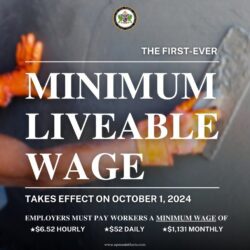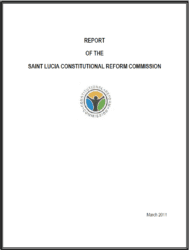 Saint Lucia’s business strategy and the looming general elections returned to the forefront of the editorial desk of Caribbean News Global (CNG) this past week. On both matters, Saint Lucia needs a course correction (of action) to entirely alleviate people’s fears.
Saint Lucia’s business strategy and the looming general elections returned to the forefront of the editorial desk of Caribbean News Global (CNG) this past week. On both matters, Saint Lucia needs a course correction (of action) to entirely alleviate people’s fears.
First is the revelation by the president of St Lucia Chamber of Commerce, Industry, and Agriculture, Ross Gardner, delivering his address at the 140th Annual General Meeting – ‘Building Resilience and Shared Prosperity in Uncertain Times.’ One primary concern centred on the need for substantive discussions and meaningful dialogue, the reference that the minimum wage was not afforded the prerequisite courtesy, of discussion and consultation, and was informed of details post facto, (Cost of doing business in St Lucia continues to rise, says Chamber of Commerce) with little scope for meaningful discussion. The second matter pertains to Prime Minister Philip J. Pierre commenting on a fixed date for general elections in Saint Lucia.
Truth, accountability, and the Constitution play a pivotal role in modern democracies. Significantly, Prime Minister Pierre, said: “I believe in consensus. I believe in discussion. I believe in bringing the minds together.”
Taken with the inference that the Chamber of Commerce was not part of the “consensus” on minimum wage and was post facto, with little scope for meaningful discussion – the distinction between simple fact and fiction, is supposedly incoherent.
Moreover, the matter of a fixed date for general elections in Saint Lucia amounts to “chew the cud” and has resurfaced for the illusion of distractions and perceived relevance of the 2024 constitutional reform committee. The matter has been previously digested and does not necessarily need to be rehearsed (beyond dusting the 2011 report) except for new work applicable to dull minds.

Minimum wage – a political decision
It is not uncommon that a political decision of a ruling government would not be legislated, as the minimum wage was made law by unanimous decision. Moreover, the overture was centred on “putting the people first” a campaign slogan – claiming to act in the people’s interest.
The department of labour in their press release – implementation of the national minimum wage – coined the legislation as “ a significant step towards ensuring fairness and equity in the workplace, providing a guaranteed baseline income for all categories of workers across the nation and urged all employers to comply with this new minimum wage standard and reminds businesses that this wage is to be paid in addition to any allowances, gratuity, and overtime compensation.”
The directive continued: “Inspections and enforcement measures will be in place to guarantee compliance with the law, and we encourage anyone with concerns or questions regarding the minimum wage to reach out to the department of labour for guidance. … will continue to advocate for fair wages and work conditions, ensuring that both employers and employees benefit from a thriving and equitable society.”
The language and actions of governments have implications that must be decoded in real time. Moreover, in a culture that operates in disjointed silos, it is easy for governments with super majorities to fast-track bad laws.
Over the years, super majorities in parliament (16-1/14-3/15-2) have not worked in the interest of the people to transform the Constitution, the justice department and law enforcement, and to get rid of government agencies and dead-end parastatals. A comprehensive housecleaning would be a welcome departure from what obtains.
It is also not without precedence that business and politics are at opposite ends of the small Saint Lucian society. This has dramatically reduced governance and business footprints, to pursue additional resources and set a perspective that drives Saint Lucian innovation.
Thus, it is past due haste that meaningful engagement at a high level pre and post-national development and business legislation coexist. The language of commerce and business must escape the rattling cry and the seasonal wind of political change to bring environmental stability for business, trust-inspiring legislation, and investments. A development plan consistent with a long-term strategy for economic development is abstract in the rubric of the necessary collobaration between the government, the public, (civil society) and the private sector. Average growth rates (2% – 4.5%) reflect economic performance, and development planning not based on increased investment, advanced production and enhanced productivity.
For greater context, scope or clarification, the parliament and cabinet of Saint Lucia are one of the same, populated with ambitious indicators for winning elections, and fulfilling government political commitments, (nothing else).
Ambitious milestones are not set for national development and delivering real institutional change across a wide spectrum. The result is visible in ad-hoc adventures that represent an unrelenting approach to the priorities of working people.
In the examination of measurable milestones and prioritization, the government has not delivered real improvements. Perhaps much of this is clogged in pipe dreams.
Delivering on the priorities of the Saint Lucia economy, government needs a radically different approach, and new thinking capable of functioning with business partners, civil society and (proper) local government. Not constituency councils. ( The current are party-political.)
Governments must advance their ambitious programmes, however, honesty and accountability in real deliveries must reflect the priorities of working people, and the country, underpinned by innovation and institutional reform for sustainability.
The government of Saint Lucia continues to maintain that it has stabilised the economy, yet, new investments, security, energy renewal, water security, health care, agricultural reform and education – the footsteps for change – are not affirmed in the foundations of a national renewal fit for the future.
By substantive summations and documented domestic observations, the government is currently misinformed, thinking it does not matter to pick milestones, setting a plan for change to the inherent disintegrating public service and hindered public finances. Case in point. The government and taxpayers are currently unable to finance public health, wellness centres and the OKEU. $35M from health and security taxes, plus additional government budgetary allocations and now, CIP donations, are unable to cover:
- Direct Cost of Health Care: Provision of health care services $160.0 million
- National Security: Provision of national security services $84.7 million; and capital projects: $1.5 million. Total expenses: $86.2 million.
Thus, having not set realistic ambitions to achieve milestones, with plans that reflect the priorities of the working people and the small tax bracket of Saint Lucians, the fragments that underpinned national planning, national infrastructure, business strategy, and the labour market are sure to collapse.
 Fixed date for general elections in St Lucia
Fixed date for general elections in St Lucia
“As you know, we are reviewing the constitution. There is a constitutional review committee looking at the constitution with a parliamentary committee. And all these issues are going to come into play,” Prime Minister Pierre told journalists, at a pre-cabinet press briefing. “I am not a prime minister who wants to impose. I believe in consensus. I believe in discussion. I believe in bringing the minds together.”
Ideology rather than organization, and contradicting corrective actions acting with partisan motives is a spurious basis to re-open fixed date for general elections in Saint Lucia’s constitutional circus.
The matter of consensus on general elections while under threat, has not disappeared entirely, nor has the government balanced the right to a correct course (of action) after destroying the national consensus in the report of the Saint Lucia Constitutional Reform Commission, 2011.
Report – March 2011 308 Appendix XI Summary of Submissions received.
- The Constitution should make provisions for separate people to be appointed to the Executive, the Legislature and as Constituency Representatives.
- Prime Minister and Deputy Prime Minister to be elected in direct elections by the entire country.
- The elected Prime Minister would select his/her Executive (Cabinet) from professional individuals outside the Legislature.
- Senators should be elected. […]
- There should be elections on a fixed day or date for General Elections, this should be held every 5th year.
- Recall provisions be enshrined in our revised constitution to allow recall proceedings to be instituted against any elected official.
- The subject areas for Ministries should be fixed.
- There should be a fixed number of Ministries. […]
A plan for change
Attitudes towards the Saint Lucia Constitutional Reform Commission – 2011, may have fermented proceedings to the policies of recent years. However, what happened to the Constitutional Reform Report – 2011 when tabled in parliament on August 18, 2015, is a lesson in revisionist history.
The historical lessons must first be told and understood, as the re-enactment of the 2024 constitutional reform committee, reflects the evolving dynamics.
The social cohesion of Saint Lucia needs to respond to concerns about people’s fears, and the zero-sum-based political approach that has ballooned. Thanks to some politicians who are useless beyond their collective parliamentary colleagues and special political interests.
The government needs consensus on the economy, and together with business leaders must fast-track on the wider external implications of re-immigration, and how new US policies on trade will impact inflation, investment and security in Saint Lucia.
To advance Saint Lucia’s economic potential, the economic infrastructure must develop a skilled workforce, provide access to advanced technologies, implement progressive legislation and an equitable tax system, pursue effective diplomatic allies, maximize geographic advantages and acknowledge the use of strategic planning to realize growth targets.
The inherited composite of the Saint Lucia society is rapidly disintegrating, if not lost. The traditional silos have proven to be self-destructive, unable to programme new business strategies, constitutional reform and innovation.
Stuck in the colonial monarchy and all-around political unskillfulness, Saint Lucia finds itself at the mercy of diplomatic allies, and the patronage of donor agencies, as reflected in the annual budget of monotony.
A plan for change is imminent to avert worse (ing) conditions and non-outcomes in Saint Lucia. The first step is acknowledging a course correction and building a reform agenda.





